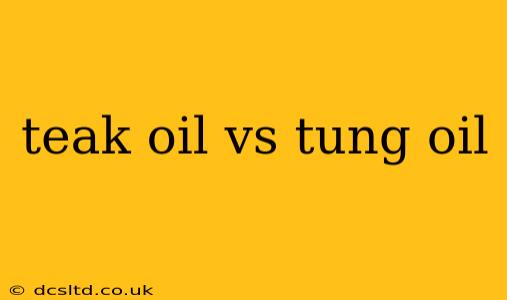Choosing the right oil for finishing your wood projects can seem daunting, especially with so many options available. Two popular choices, often confused with each other, are teak oil and tung oil. While both offer protective and aesthetic benefits, they differ significantly in their composition, application, and final results. This comprehensive guide will delve into the key differences between teak oil and tung oil, helping you make an informed decision for your next woodworking project.
What is Teak Oil?
Teak oil isn't actually derived from teak trees. Instead, it's typically a blend of various oils, often including linseed oil, mineral spirits, and sometimes other additives like driers or UV inhibitors. The name "teak oil" is a misnomer, primarily used for marketing purposes, suggesting a connection to the durability associated with teak wood. This blend is designed to penetrate wood, providing some water resistance and enhancing the natural color. It’s important to note that the exact composition can vary significantly between brands.
Advantages of Teak Oil:
- Easy Application: Generally easier to apply than pure tung oil, often requiring less work.
- Fast Drying: Dries quicker than pure tung oil due to the added driers.
- Enhanced Color: Can enhance the wood's natural color, giving it a richer appearance.
- Water Resistance: Offers a degree of water resistance, though not as significant as other finishes.
Disadvantages of Teak Oil:
- Not a True Oil: The blend may contain solvents and other additives that are not as environmentally friendly as pure tung oil.
- Less Durable: Provides less long-term protection compared to pure tung oil or other durable finishes.
- Requires More Frequent Reapplication: Due to its less durable nature, it needs more frequent reapplication to maintain its protective qualities.
What is Tung Oil?
Tung oil, on the other hand, is a true oil extracted from the seeds of the tung tree. It's a naturally occurring drying oil known for its excellent durability and water resistance. Pure tung oil, unlike many teak oil blends, is considered a natural and environmentally friendly option.
Advantages of Tung Oil:
- Durable Finish: Creates a hard, durable finish that offers excellent protection against water and abrasion.
- Natural and Eco-Friendly: Pure tung oil is a naturally derived product with minimal environmental impact.
- Long-lasting Protection: Requires less frequent reapplication compared to teak oil.
- Excellent Water Resistance: Provides superior water resistance compared to teak oil.
Disadvantages of Tung Oil:
- Slower Drying Time: Dries significantly slower than teak oil blends.
- More Difficult Application: Requires more careful application to avoid blotchiness or uneven coverage.
- Can Be More Expensive: Pure tung oil tends to be more expensive than teak oil blends.
Teak Oil vs. Tung Oil: Key Differences Summarized
| Feature | Teak Oil | Tung Oil |
|---|---|---|
| Composition | Blend of oils, solvents, and additives | 100% oil from tung tree seeds |
| Drying Time | Fast | Slow |
| Durability | Less durable | Highly durable |
| Water Resistance | Moderate | Excellent |
| Application | Easier | More challenging |
| Cost | Generally less expensive | Generally more expensive |
| Environmental Impact | Can vary depending on additives | Generally eco-friendly |
What type of oil is best for outdoor furniture?
For outdoor furniture exposed to the elements, pure tung oil generally offers better protection due to its superior durability and water resistance. While teak oil might provide some initial protection, it will require more frequent reapplication to withstand harsh weather conditions.
Is tung oil food safe?
Pure, untreated tung oil is generally considered safe for food contact after proper curing. However, it's crucial to ensure the oil is 100% pure tung oil and not a blend containing additives or solvents that could be harmful. Always check the manufacturer's specifications and follow their recommendations for food-safe applications.
Which oil is better for kitchen countertops?
Again, for kitchen countertops, the superior water resistance and durability of pure tung oil make it a better choice. However, even with tung oil, it's essential to ensure the proper curing process is followed before any food contact to guarantee safety.
What is the best way to apply tung oil?
Applying tung oil requires patience and a careful approach. Multiple thin coats are key to achieving even penetration and a durable finish. Allow ample drying time between coats, following the manufacturer's recommendations. Avoid over-application, as this can lead to a sticky or gummy surface.
By understanding the distinct properties of teak oil and tung oil, you can choose the best finish to protect and enhance your wood projects. Remember that the final decision depends on your specific needs, budget, and the intended use of the finished item.
